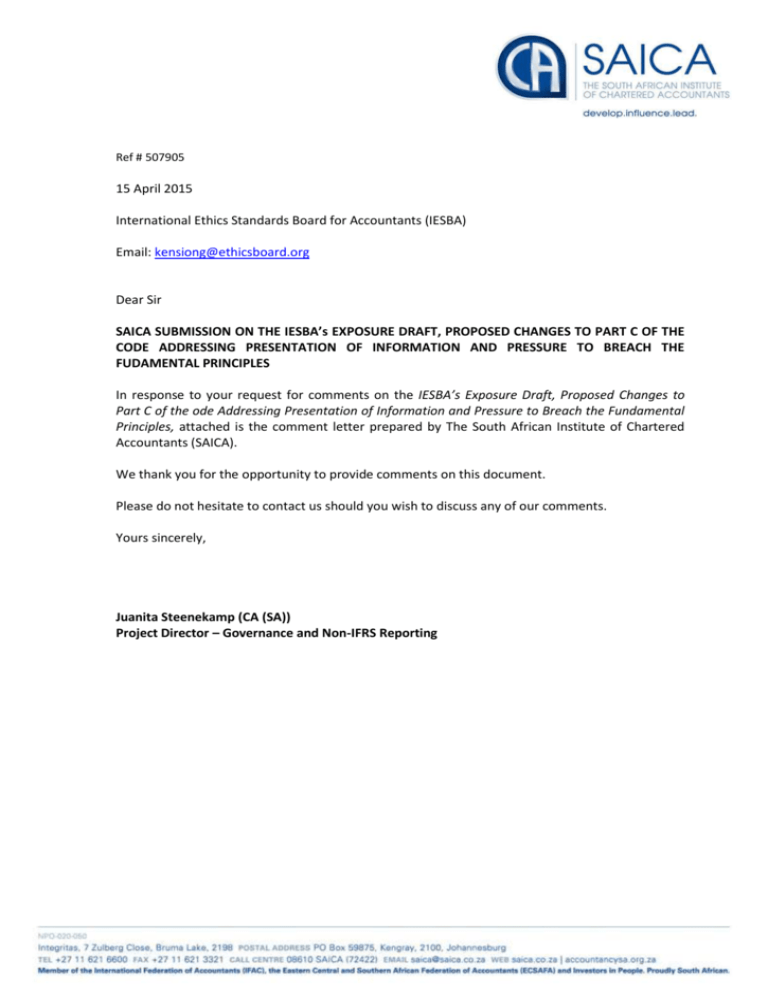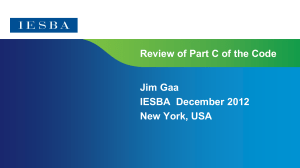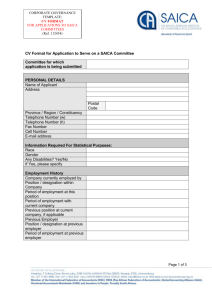Question 1
advertisement

Ref # 507905 15 April 2015 International Ethics Standards Board for Accountants (IESBA) Email: kensiong@ethicsboard.org Dear Sir SAICA SUBMISSION ON THE IESBA’s EXPOSURE DRAFT, PROPOSED CHANGES TO PART C OF THE CODE ADDRESSING PRESENTATION OF INFORMATION AND PRESSURE TO BREACH THE FUDAMENTAL PRINCIPLES In response to your request for comments on the IESBA’s Exposure Draft, Proposed Changes to Part C of the ode Addressing Presentation of Information and Pressure to Breach the Fundamental Principles, attached is the comment letter prepared by The South African Institute of Chartered Accountants (SAICA). We thank you for the opportunity to provide comments on this document. Please do not hesitate to contact us should you wish to discuss any of our comments. Yours sincerely, Juanita Steenekamp (CA (SA)) Project Director – Governance and Non-IFRS Reporting SAICA SUBMISSION ON THE IESBA’s EXPOSURE DRAFT, Proposed Changes to Part C of the Code Addressing Presentation of Information and Pressure to Breach the Fundamental Principles April 2015 RESPONSE TO REQUEST FOR SPECIFIC COMMENTS 1. Is the enhanced guidance on applying the “fair and honest” principle in section 320 helpful? Response: Yes, the fair and honest principle as set out in the proposed change does present a much better guidance to assist the PAIB in determining what actually requires to be considered when under the heading “Presentation of Information”. The section now refers the PAIB back to the fundamental principles which stresses the holistic approach that the PAIB must take when involved in presentation. 2. In particular, do the respondents support the guidance in paragraph 320.3 addressing the issue of misuse of discretion in a manner that is intended to mislead? If not, please explain why. Are there any other considerations relating to this issue that should be addressed in section 320? Response: SAICA supports the guidance provided. Additional guidance to be considered: Where the PAIB has the ability to exercise discretion but by doing so there will arise either a potential benefit or possible avoidance of negative consequence for the PAIB, then a safeguard would be for the PAIB to clearly set out his thought processes in arriving at the final decision or choice, detailing why it is believed to be the correct one, this document should be clear enough that should experts study it, they would endorse the choice made by the PAIB. Voluntary accounting restatements (in our jurisdiction: allowed only in response to a change in policy or discovery of a material prior period error) are very commonly used to obfuscate financial statements 3. Paragraph 320.4 provides guidance as to what PAIBs are expected to do ethically in order to prepare and present fairly and honestly information that does not have to comply with a relevant reporting framework. Is this guidance sufficient? If not, what further guidance could section 320 usefully provide? Response: In our view this section should also address the situation where the preparation deals with information that does not comply with a relevant framework. Possible additional suggested wording for 320.4 “where the information is not being prepared according to a recognised framework the PAIB needs to be mindful of the purpose of the information, ensuring that it is compiled in accordance with the fundamental principles of this Code, and presented in an 2 SAICA SUBMISSION ON THE IESBA’s EXPOSURE DRAFT, Proposed Changes to Part C of the Code Addressing Presentation of Information and Pressure to Breach the Fundamental Principles April 2015 appropriate context so that it does not mislead the user, the information presented should be understandable, contain reliable and complete information meaning disclosure of all known pertinent facts to the user of the information.” 4. Do respondents agree that where PAIB relies on the work of others, the PAIB should be required to take reasonable steps to be satisfied that such work enables the PAIB to comply with the overarching principle in paragraph 320.2? Response: Yes, a PAIB needs to reasonably ensure that information being used was prepared in a way that complies with the fundamental principles of the code. 5. Do respondents agree with the guidance proposed in paragraph 320.6 and 320.7 regarding disassociation with misleading information? Are there other actions that could be specified? Response: Yes, we agree with the guidance, we would however suggest additional guidance. SAICA would recommend the code be explicit to the PAIB, that evidence that the information is misleading must be factual, evidence needs to be confirmed with another objective trusted source prior to taking action. Once established the information is indeed misleading in the absence of formal policies and procedures available to the PAIB, an approach is suggested as follows - set up a meeting with the preparer minute the conversation, after which if the preparer does not agree within a reasonable time frame to rectify the information, then present the evidence to his senior, if still not successful consider approaching the executive line head. The HR executive is also often a helpful internal company point of contact, if the PAIB is still concerned thereafter the CEO could assist in resolving the matter. Failure to resolve with internal parties, the next line of defence would be contacting those charged with Governance, and or the audit committee Chairman if one is available. The external auditor, having to comply with the same confidentiality requirement in many instances would be a most suitable party to confide in and receive additional guidance. If after all these attempts and public interest is at stake, we recommend disassociation and potential resignation and reporting to external parties like regulators be considered. Care must however be taken when reporting to any party mentioned in the two paragraphs that the fundamental principle of Confidentiality is not violated. 3 SAICA SUBMISSION ON THE IESBA’s EXPOSURE DRAFT, Proposed Changes to Part C of the Code Addressing Presentation of Information and Pressure to Breach the Fundamental Principles April 2015 Section 370 1. Do respondents agree with the overarching requirements in paragraphs 370.1 and 370.2? Response: Most definitely the code should prescribe repercussions for a PAIB exerting inappropriate influence on another PAIB to breach any fundamental principle of the code. A professional in business must not cause or succumb to pressure leading to a beach of any fundamental principle. The list of examples could be extended to include capital market participants, such as shareholders and /or bondholders. 2. Are the illustrative examples of types of pressure that could result in a breach of the fundamental principles in paragraph 370.4 helpful? Response: The examples are helpful, SAICA would just for clarity add the words “inter alia” after the word “Include:” i.e. “Examples may include inter alia…” to emphasize the list in not all encompassing but a good set of examples. Pressure from superiors to inappropriately reduce the extent of work performed in order to reduce costs”. This paragraph can be amended, it seems impossible to reduce the extent of work already performed. In the alternative it appears to us to be better to restate thus: Pressure from superiors to inappropriately reduce the extent of work to be performed in order to reduce costs. 3. Is it sufficiently clear that section 370 addresses pressure that could result in a breach of the fundamental principles, as opposed to routine pressures that exist in the work place? In particular, does paragraph 370.5 provide sufficient guidance to assist the PAIB in making that distinction? If not what considerations should the PAIB take into account? Response: The cross referencing to policies, codes and procedures is a means to see if the pressure being applied is unreasonable given the company rules, but it presupposes these documents exist, if they don’t the guidance is not helpful, the approach in the absence of these It would be helpful to review evidence of the type of pressure being placed on the PAIB if available. 4 SAICA SUBMISSION ON THE IESBA’s EXPOSURE DRAFT, Proposed Changes to Part C of the Code Addressing Presentation of Information and Pressure to Breach the Fundamental Principles April 2015 Examples would be documenting conversations with the person exerting the pressure, keeping minutes of discussions in meetings, printing out emails and document descriptions of pressure including witnesses where available. The test to see if the person applying the pressure is breaching the principles of the code would be if an expert after scrutinizing the circumstances would come to a clear understanding the pressure goes against the principle of public interest, and is unwarranted and motivated by an intention to breach the code for personal benefit or to avoid a negative consequences. While we agree that professional may assist in helping the affected PAIB to deal with the pressure experienced, we are not of the view that professional bodies, regulators, or industry can make much of a contribution to resolving the individual’s feeling of being pressurized. 4. Do respondents find the guidance in paragraph 370.6 on responding to pressure that would result in a breach of the fundamental principles helpful? Are there other actions that could be considered? Response: Yes. We do propose that the request for restructuring or segregation of responsibilities (second bullet) should be placed lower down before the bullet discussing resigning. The PAIB should state a clear well thought out case to the person intimidating them, providing them with an opportunity to cease applying the pressure and rectify the incorrect behaviours, failing which the PAIB reserves the right to escalate the matter with a superior. If not rectified then consulting with the superior and if that also fails to approach the available governance structures and if deemed appropriate obtain the assistance of the HR Executive. If all is unsuccessful the PAIB should ask for a transfer or consider resignation. 5. Are the references to other sections of Part C of the code, in paragraph 370.9, helpful? Response: The references are clear, but can possibly be better phrased. General comments 1. Preparers: SAICA believes the code clarifies fair and honest, it is important that preparers understand that being a member of the profession comes with the responsibility to protect the public interest. The Code will also for the first time warn the PAIB seeking to exert pressure on others that they will be made accountable for their actions and the harm it causes to other good standing members and the profession. 5







